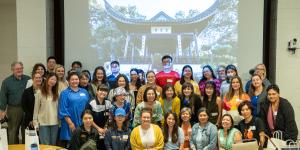On September 29, 2024, the USC U.S.-China Institute hosted a workshop at the Huntington’s Chinese garden, offering K-12 educators hands-on insights into using the garden as a teaching tool. With expert presentations, a guided tour, and new resources, the event explored how Chinese gardens' rich history and cultural significance can be integrated into classrooms. Interested in learning more? Click below for details on the workshop and upcoming programs for educators.
U.S. State Department, 2020 Hong Kong Autonomy Report, May 28, 2020
Congress requires the U.S. Secretary of State to report on the relative autonomy of Hong Kong and whether that autonomy warrants continued differential treatment by U.S. agencies. This report is issued by Mike Pompeo, Secretary of State.

Reports on Hong Kong 2019 | 2020
Consistent with sections 205 and 301 of the United States-Hong Kong Policy Act of 1992 (the “Act”), as amended by the Hong Kong Human Rights and Democracy Act of 2019, and section 7043(f)(4)(B) of the Department of State, Foreign Operations, and Related Programs Appropriations Act, 2020 (Div. G, P.L. 116-94), the Department submits this report and the enclosed certification on developments in Hong Kong from March 2019 through May 2020.
Summary
The Department of State is obligated by law to certify to Congress annually whether Hong Kong continues to warrant differential treatment under U.S. law. After careful consideration, as required by section 301 of the Hong Kong Policy Act, I can no longer certify that Hong Kong continues to warrant such treatment.
This decertification should come as no surprise, given the facts on the ground. When the United Kingdom handed Hong Kong over to the Chinese Communist Party-led regime in Beijing in 1997, the hope was that free and prosperous Hong Kong would change China by leading the regime in a more liberal direction. China’s promise was that for 50 years, Hong Kong would have certain rights and a system of governance guaranteed by the Sino-British Joint Declaration, a UN-filed international treaty. Instead, authoritarian China has now changed Hong Kong.
The erosion of the territory’s liberties has happened gradually over a period of years, and has accelerated since General Secretary Xi Jinping took power. In 2014, Beijing effectively ruled out universal suffrage as a means to elect the territory’s leader. Dissidents were spirited out of Hong Kong into mainland China and forced to “confess” alleged crimes. Facing Beijing-backed advertising boycotts and other pressure, local media outlets self-censored their coverage of the CCP. Beijing announced the expulsion of U.S. journalists working from mainland China, and said it would prohibit them from reporting from Hong Kong as well.
In last year’s report, I asserted that Hong Kong maintained “a sufficient – although diminished – degree of autonomy,” as an acknowledgement of Beijing’s escalating assault on the territory. Since that report was issued, China has shed any pretense that the people of Hong Kong enjoy the high degree of autonomy, democratic institutions, and civil liberties guaranteed to them by the Sino-British Joint Declaration and the Basic Law.
In November 2019, the Legislative Affairs Commission of the National People’s Congress Standing Committee issued a statement asserting that only the NPCSC has the power to decide whether Hong Kong laws comply with the Basic Law. This statement challenged fundamental principles of autonomy and the long-established practice of Hong Kong courts exercising the power of judicial review to adjudicate laws and review government actions.
On April 17, 2020, the Chinese government’s Central Government Liaison Office (CGLO) in Hong Kong issued a statement claiming that CGLO and the central government’s Hong Kong and Macau Affairs Office in Beijing are not bound by a provision of the Basic Law which states that “no department of the Central People’s Government . . . may interfere in the affairs” of Hong Kong.
On May 22, 2020, the PRC announced a proposal at the National People’s Congress (NPC) to unilaterally and arbitrarily impose national security legislation on Hong Kong, a procedural step which contradicts the spirit and practice of the Sino-British Joint Declaration and the One Country, Two Systems framework.
The people of Hong Kong turned out in the millions to protest these violations of their human rights and fundamental freedoms, not to mention China’s betrayal of its own promises to the territory. Instead of listening to their grievances and finding a democratic solution, the Hong Kong government deployed tear gas and made mass arrests, including of peaceful demonstrators, while Beijing reportedly dispatched its People’s Armed Police into Hong Kong, contrary to its promises under the Basic Law and the Sino-British Joint Declaration.
Hong Kong flourished for decades as a bastion of liberty and example of what China could aspire to become. I hope that someday in the future, I will be able to recertify that the territory once again warrants differential treatment under U.S. law. Given present circumstances, the chance of that happening is remote. In the meantime, the United States stands with the people of Hong Kong as they struggle against the CCP’s increasing denial of the autonomy they were promised.
Featured Articles
Happy Lunar New Year from the USC US-China Institute!
Events
Ying Zhu looks at new developments for Chinese and global streaming services.
David Zweig examines China's talent recruitment efforts, particularly towards those scientists and engineers who left China for further study. U.S. universities, labs and companies have long brought in talent from China. Are such people still welcome?






